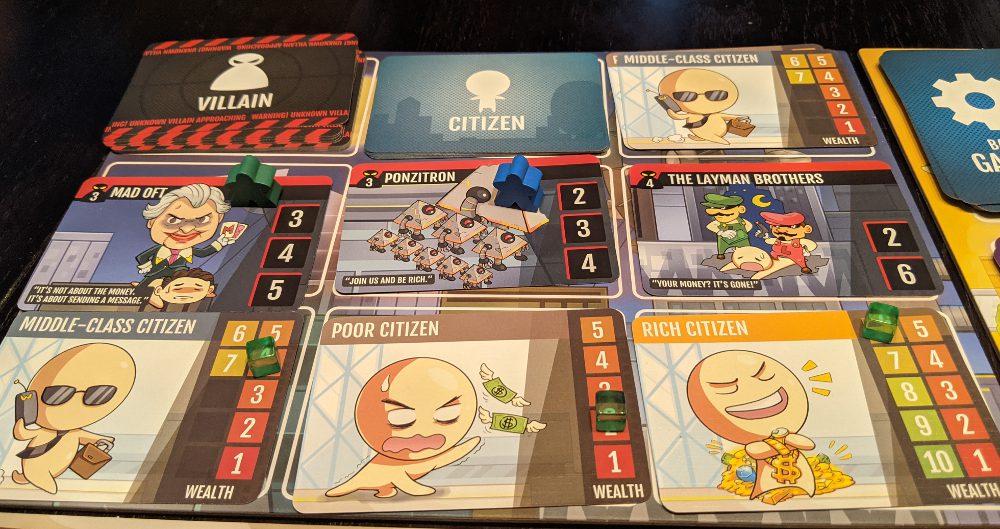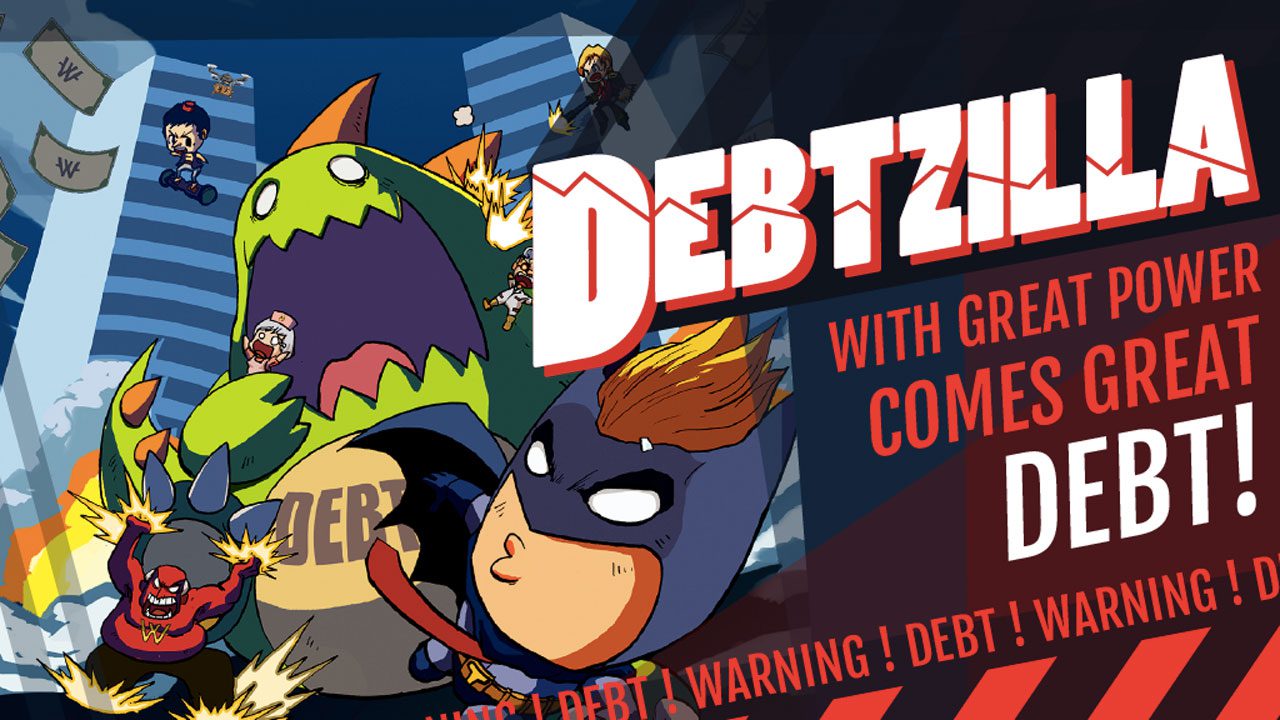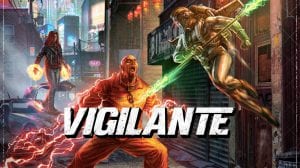Disclosure: Meeple Mountain received a free copy of this product in exchange for an honest, unbiased review. This review is not intended to be an endorsement.
It must suck living in the land of Banana Republic. When they first opened their doors to the world, they had a Wongamania situation with their economic cycles having more mood swings than a teenager on TikTok. After that little scare, several of their entrepreneurs jumped into the Cryptocurrency craze, causing the popular Flyt coin to go bust due to their constant mining and rumor spreading. Now many of its citizens are declaring bankruptcy thanks to the numerous scammers slithering the streets looking for their next prey. This calamity in the making has caught the attention of an ancient creature known as Debtzilla.
Like any other creature that just woke up, it’s hungry. Every time a citizen is bankrupted, or you take on debt, Debtzilla’s power grows stronger. Banana Republic is on the verge of collapse, and it’s up to you and your friends to make sure that doesn’t happen. The good news is you have a decent job during the day, allowing you to buy gadgets or acquire some insurance, but your credit card debt isn’t helping the situation. In the evening, you don your superhero outfit and prowl the streets to take on the self-appointed financial gurus, telemarketers, and zombie banks. After defeating all of the villains, you will face Debtzilla itself in a final showdown.

Freeform Flow
Unlike other cooperative games, there are no turns here. The game’s structure divides itself into four phases, and everyone plays at the same time. Thanks to this unique structure, downtime is just as rare as an honest politician and keeps the game going at a brisk pace. Much like any other cooperative game, everyone also has asymmetrical player powers that give them a role in this narrative landscape.
This might sound like an easy game to get into, but the rulebook makes it a hurdle and a half to understand it. It does shock me because after playing several games from this publisher, I was under the impression these games focused on the “family-friendly” market. To make matters worse, it also makes completely wrong references. It mentions “luxury cards” when it is now called Lifestyle cards. There is also a picture of a player mat for each player, a component that doesn’t exist physically in the game, nor is it listed under the component list. A rulebook is a bridge between the player and the game designer, and this bridge collapsed way before the player got there.
With that first bit of criticism out of the way, let’s get into the actual gameplay itself. As mentioned before, this game has several phases, and the first one is the Working Phase.
Everyone starts a game with an income deck of cards such as Lifestyle, Savings, and Debt cards. You will draw five cards and put them in your play area. Whatever you draw is your income for the round. If you don’t have enough cards, you reshuffle your discard pile.
Yes, this is a deckbuilding mechanism, and I’ll have to confess that this is a fascinating twist. A typical deckbuilder often uses card draws to dictate your actions for your turn. Debtzilla mixes this up by having the deck act as a way to generate resources for you to take your actions as you see fit.
After grabbing your resources, you have to take a card from the working board and add it to your discard pile. It has your starting cards such as Savings and Lifestyle, but it also contains other cards such as Insurance and Debt cards. Insurance cards give you a blue shield resource that protects you from Debtzilla’s nasty effects for one turn. The debt cards? Another interesting gimmick.

Managing Your Debt Like A Champ
There are three different types of debts in this game: Credit card, School, and Home. Every debt gives a certain short-term advantage, such as an extra die from School or money from Home. While this sounds all fine and good, the problem is when you acquire these debt cards, Debtzilla’s health increases. For every 10 health, Debtzilla increases its interest, which is a fancy way of saying health regeneration. In other words, the more health it has, the higher its health regeneration. If you pay off your debt, its health is decreased. As if that didn’t sound painful enough, each threshold forces you to draw a Debtzilla card, which acts as a random event that hurts your team, and it’s another card you need to fight once you defeat all of the villains.
At this point, Debtzilla’s theme is pounding your head like you went to a New Year’s Eve party. This game is all about balancing your budget and lifestyle without relying on debt to fuel everything. You need to take on debt as a form of leverage to become stronger, but you need to plan a way to pay it off quickly once you grab them. Neglecting the compounding interest will eventually make Debtzilla’s health go over 99, and that’s a game over.
While that was a bit of a lengthy explanation for the first phase, it does cover the various core concepts of Debtzilla. After grabbing your income and picking a new card to add to your discard pile, you will go shopping because we all know retail therapy is the prime solution for a debt crisis.

In this short-lived phase, you and your friends will look at the available gadgets. Every single gadget will either give you some form of die manipulation, such as adding to the result or give you one additional die. The basic blue cards are cheap, but you can only use one of them per round unless you bought a delivery drone. Advanced purple cards have similar powers, yet they are permanent boosts that aren’t limited by the blue’s “one per turn” silliness. As you already guessed before finishing off this sentence, these purple gizmos are more expensive than the blue ones. Once that bit of dialogue with your friends about who gets what is over, you are off to the streets to beat the crap out of scammers targeting the locals.
The locals come in three forms: Poor, Middle-Class, and Rich. The wealth status determines their starting wealth value, and if they ever hit 0, they are bankrupted, and their starting wealth adds to Debtzilla’s health.
Across from these locals are the beloved villains such as the Ponzitron, the Layman Brothers, and Demonic Telemarketer. Each Villain has a Scam Value and Weak Points. The scam value is how much wealth they take away from the citizen across from them each turn, while the weak points are the numbers the Heroes need to roll on their dice.

Striking Down The Scams
Each player can only attack one villain, and after finalizing the positions, the Heroes roll the dice. There are no re-rolls here, so you must rely on your gadgets to pick up the slack. If you fill the weak points, you defeat the villain, and the citizen keeps their wealth for another day. Failure to beat the villains means they get to scam a citizen, reducing their wealth. If the villains bankrupt all the citizens, you lose the game.
If the game doesn’t end, Debtzilla does its thing. The interest increases, the thresholds are checked, and a new round begins. To defeat Debtzilla, you must first defeat all of the Villains, then all of the active Debtzilla cards. These Debtzilla are identical to the Villian cards, only with more numbers to fill and more painful effects.
Based on my experience playing Capital Gains Studios’ previous games, Debtzilla is their most ambitious project yet. The artwork has numerous parody references to real-life financial concepts and celebs that are all on point. Using deckbuilding as a form of resource income is an amazing underappreciated idea. Debtzilla becoming stronger by having the players take debt cards with potential long term consequences emphasizes the importance of balance. Yet, as a cooperative game, the cornerstone of all these ideas feels like something from Ikea.
At its core, cooperative games are puzzles. Whether you are trying to cure diseases in Pandemic or escaping a sinking island in Forbidden Island, these are all puzzles. These games are a combination of systems and mechanisms working together to form a scenario that the players must solve as a team. This involves looking at the state of the board, pointing out potential solutions, and having a conversation with your peers. If there is no discussion, there is no cooperation.
Debtzilla’s major issue is the decisions are so obvious that it barely invokes any dialogue from the players. It also does not help that the entire game centers around dice rolls. Randomization is a vital element in cooperative games, so I understand the reasoning behind this. In Pandemic, the game has card draws to up the difficulty, yet it uses other methods to ensure that the card draws work. The problem with Debtzilla’s use of randomization is that it’s the only element it has going for it. Your only options for the dice are to either add more dice or use gadgets to manipulate the results. Nothing more.
Another area of concern is the heroes. Each of the heroes has their abilities, as you would expect in these types of games. While this sounds normal, the problem lies that most of these abilities are so straightforward that there is hardly any thinking on your part. Ali Baba gets a discount when buying gadgets, so you become the “gadget guy” out of the group. Lady Easing prevents citizens from bankruptcy, meaning you are now playing a support role. I know Pandemic does the same thing, and it bothered me back then too.

Questionable Heroes
As weird as this sounds, I prefer the powers of the anti-heroes. Tweetman, a mutant mix of Batman and former president Trump, uses his abilities to scam and bankrupt citizens for short-term gain. Debt Hulk rolls more dice when Debtzilla’s health is at a high point, making him a high-risk hero. I like them because they are a topic of conversation with your teammates due to their potent but dangerous abilities.
Even though I’ve spent the past few paragraphs poking holes, I see this game as a package of good ideas with questionable execution. The dilemma with cooperative games is that they are one of the most difficult genres for a game designer. It’s a crowded genre full of great games, and as a tabletop critic, it is my obligation to compare this game to what’s out there. Because of this ironically competitive environment, Debtzilla being almost good is not good enough.
Review copy provided by the publisher. You can purchase a copy on Amazon US











Great overview!